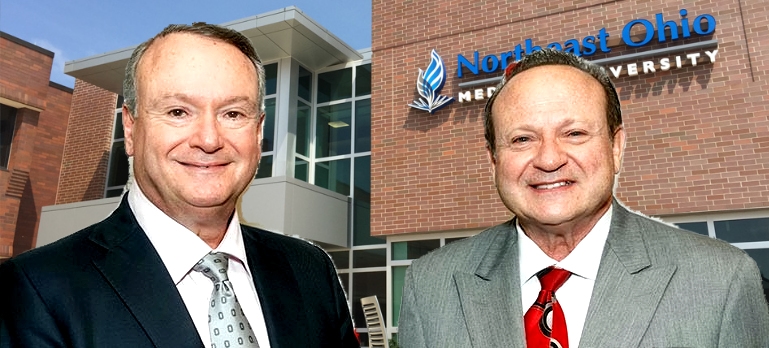$10 million gift from Bitontes to Northeast Ohio Medical University

Northeast Ohio Medical University is moving forward with a dental college on its Rootstown campus and already has amassed $11 million toward its $25 million goal to make the dental school a reality.
The college will be named the Bitonte College of Dentistry in recognition of a $10 million gift from Drs. Gary and David Bitonte, sons of the late Dr. Dominic A. and Helen M. Bitonte, toward the dental college. The donation is the largest individual amount the NEOMED Foundation has ever received and takes NEOMED 40% toward its $25 million goal to establish and sustain the dental college.
The college, which expects to start admitting students in 2025, will be the third program in Ohio where potential dentists can study. The others are a public program at Ohio State University and a private program at Case Western Reserve University in Cleveland.
NEOMED had considered adding a dental school in 2014. At the time, the university was led by Dr. Jay Gershen, who was a dentist. At that time, NEOMED leaders said Portage County had 32 dentists per 100,000 residents — about half the national average of 60 dentists per 100,000 people.
Dr. John Langell, president of NEOMED, said the university’s partners asked him to revive the discussions, citing the lack of dentists in the region and the impact of oral health on other health conditions. Last year, NEOMED began studying the feasibility of the dental school, potential training sites, curriculum and financial sustainability.
NEOMED’s board of trustees approved the addition of the dental college Sept. 15, after Langell cited evidence outlining the need for more dentists to serve rural and underserved populations.
Langell said Kaiser Family Foundation data and an Ohio Department of Health map show that oral health is the top unmet health care need of Ohioans, and 77 of Ohio’s 88 counties are Health Professional Shortage Areas for oral health.
“Oral health is the No. 1 public health issue in the state of Ohio,” he said.
The first classes won’t begin until fall 2025 because the university will need to have the state chancellor release $1 million in startup funding issued by the state, then hire a founding dean and staff, and become accredited. Existing space on the campus will be used for classes, laboratories and a dental simulation lab for students, and a dental clinic also will be established.
Langell said a “community-based model” will be used, allowing clinical training to take place in the field at a variety of partner sites in the region. It will take four years to earn a doctorate in dentistry.
About 50 students are expected to be admitted to the first class at the college of dentistry, making the program smaller than the university’s medical, pharmacy and graduate programs. About 29 positions will need to be hired for the dental college, including the founding dean and the dean’s staff.
Most of the students, Langell said, would be from Ohio, or would be willing to come from other areas to serve underserved areas.
A 16-member External Advisory Council will help establish the dental school, establish commitments from training sites and vet applicants for the founding dean.
The Bitonte brothers said they wanted to honor their parents, who believed strongly in oral health and philanthropy. The family includes several physicians and dentists, and their father was a doctor of dentistry. Their mother, they said, was part of an auxiliary group of dentists’ spouses who would speak in schools about proper oral care.
“Gary and I talked about it and we said, ‘Wow, this is a fabulous thing for NEOMED. It’s a fabulous opportunity for the community and for Northeast Ohio,’” said David Bitonte said in a statement. “And to add a third dental school to the state of Ohio, which is in need of dentists, we thought that was a wonderful way to honor our parents. We didn’t quite know how we would do it or what we would do. But we held a number of meetings with NEOMED to arrive at the opportunity that’s presented today.”
Gary Bitonte said oral health can affect overall health in many ways, such as digestive and nutritional problems arising from not being able to chew food.
“It’s been known for a long time that there is a correlation between oral health and general health, and there are several examples of that. For instance, if there are detrimental bacteria in the oral cavity, the bacteria can migrate through the bloodstream and attach to the valves of the heart, which subsequently gives severe cardiac problems,” Gary Bitonte said in a statement.
In addition to the Bitonte gift, the state has earmarked $1 million toward the public dental college. Langell credits state Sen. Jerry Cirino, who had touted the need for a third dental college in Ohio, and state Rep. Gail Pavliga for gaining support for the funding.
“There is a need for dentists,” Cirino told Portage County commissioners last year. “Two dental schools in Ohio is not adequate.”
Langell said he anticipates the remaining money needed will be raised “very quickly.”

